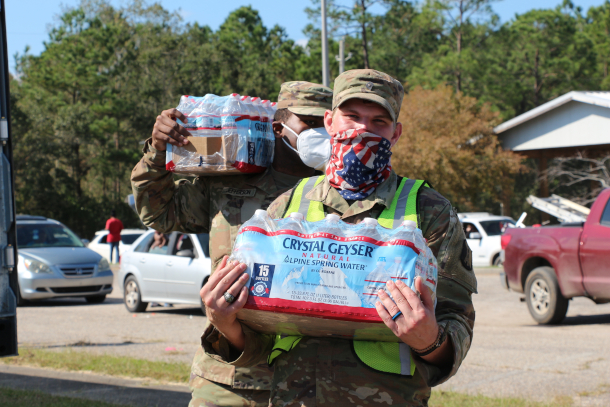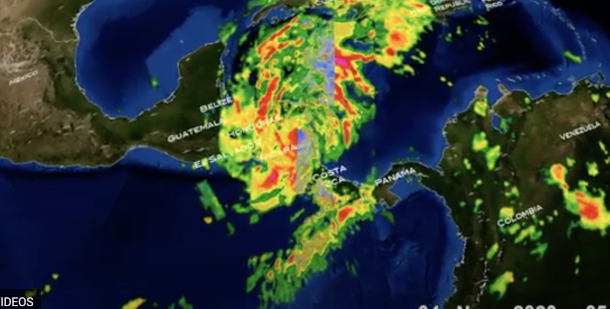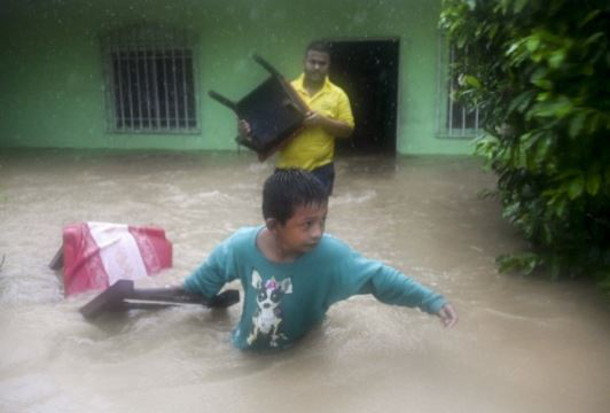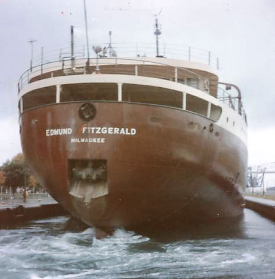Beyond the Headlines
Air Date: Week of November 6, 2020

National Guard Soldiers distributing water around Mississippi communities after hurricane Zeta. (Photo: Danielle Thomas, U.S. National Guard, Flickr)
This week on Beyond the Headlines, Environmental Health News Editor Peter Dykstra and Host Aynsley O’Neill talk about the numerous major hurricanes in the Atlantic this year. Then it’s on to Russia, which claims it will use carbon capture to offset emissions from its full-steam-ahead approach on gas and oil production. And in the history calendar, they look back to the wreck of an iron ore freighter in Lake Superior that inspired a hit song.
Transcript
CURWOOD: It’s Living on Earth, I’m Steve Curwood.
O’NEILL: And I’m Aynsley O’Neill.
O’NEILL: It's time now for a look Beyond the Headlines with Peter Dykstra. He's an editor with environmental health news that's ehn.org and daily climate.org. He should be on the line now from Atlanta, Georgia. Hey there, Peter. How are you doing?

Hurricane Eta flooded homes from Panama to Guatemala. At the time of this publication, 57 people have been reported dead. (Photo: Screen capture from NASA, public domain)
DYKSTRA: Hi, Aynsley. I'm doing all right. We had a slight brush here in Atlanta with one of those Greek alphabet, hurricanes, hurricane Zeta passed by this past week, power was out for a big part of the city, almost out in my building, but we made it through. And let's talk about the rest of the hurricanes down here, starting in Asia with typhoon Goni, one of the biggest storms on record, although it missed the big population areas in the Philippines. A death toll but a relatively low death toll, just to show that it's not just the Atlantic, where we're setting records, but elsewhere in the world where some of those frequent severe storms predicted with climate change are a reality. Hurricane Eta was blowing through Central America this week. We've never been farther in the Greek alphabet. The only time we've gotten this far was 15 years ago, 2005, the year of Katrina, and Rita, New Orleans and all of Louisiana took a beating this year, with five named storms making landfall so far and nearly another full month to go. The Atlantic hurricane season is considered to be on until November 30.
O’NEILL: Yeah, it's never a good sign when we've moved through the Roman alphabet. And now we're on to the Greeks. But tell us, Peter, what else do you have?

Hurricane Eta hit Nicaragua and then moved to neighboring Honduras and Guatemala. This picture is of a father and son leaving their homes in Guatemala after it was flooded from the Category 4 hurricane. (Photo: Ennoti, Flickr, Public Domain)
DYKSTRA: Oh, yeah, Russia just said forget about it to cutting back on it's economically crucial oil and gas production. They say they're gonna keep going for decades, they've ruled out cutting back substantially natural gas, and natural gas exports to the EU are a huge part of the Russian economy. They say they're going to pursue carbon capture, no nation has been able to make substantial progress on that to date. And it's a stark contrast to other economic powers on the Pacific Rim. Both South Korea and Japan are right now struggling and pledging to make their way to being carbon neutral within the next 30 years.
O’NEILL: All right, then, Peter, what do you have from the history books for us?
DYKSTRA: 1975, November 10th to be exact. I was a freshman in college. There wasn't much made a bet at the time, but on November 10, an iron ore freighter called the Edmund Fitzgerald wrecked and sank in a storm in Lake Superior.
O’NEILL: Well, I'm not gonna lie, Peter, I was definitely not a freshman in college in 1975. But tell me a little bit more about this wreck.

The Edmund Fitzgerald was a freight ship that sank in the Great Lakes on November 10, 1975. (Photo: U.S. Army Corps of Engineers, Flickr, CC BY SA 2.0)
DYKSTRA: Well, you had 20 years to go before you were even a fetus. In 1975 Edmund Fitzgerald made regular runs from Duluth, Minnesota, where iron ore was offloaded from the Iron Range in Minnesota, shipped across the lakes to the steel mills in Cleveland never made it even halfway to Cleveland. It got caught in an early winter storm, it sank, the crew died and a year later it was a hit song by Gordon Lightfoot that made it as the top 40 hit from the Canadian folk singer. That didn't happen very often, either.
O’NEILL: All right. Well, thank you. Peter. Peter Dykstra is an editor with environmental health news. That's ehn.org and dailyclimate.org. We'll talk to you again real soon.
DYKSTRA: All right. Thanks a lot. Talk to you soon.
O’NEILL: And there's more on these stories on living on earth website. That's loe.org
Links
The Washington Post | “‘Zeta Cuts Out Power to Millions Across the South Leaves Six Dead”
The Guardian | “‘Russia Rules Out Cutting Out Fossil Fuel Production in the Next Few Decades”
Sea Grant Michigan | “‘The Storm that Sunk the Edmund Fitzgerald”
Listen to Gordon Lightfoot’s Song About the Wreck of the Edmund Fitzgerald
Living on Earth wants to hear from you!
Living on Earth
62 Calef Highway, Suite 212
Lee, NH 03861
Telephone: 617-287-4121
E-mail: comments@loe.org
Newsletter [Click here]
Donate to Living on Earth!
Living on Earth is an independent media program and relies entirely on contributions from listeners and institutions supporting public service. Please donate now to preserve an independent environmental voice.
NewsletterLiving on Earth offers a weekly delivery of the show's rundown to your mailbox. Sign up for our newsletter today!
 Sailors For The Sea: Be the change you want to sea.
Sailors For The Sea: Be the change you want to sea.
 The Grantham Foundation for the Protection of the Environment: Committed to protecting and improving the health of the global environment.
The Grantham Foundation for the Protection of the Environment: Committed to protecting and improving the health of the global environment.
 Contribute to Living on Earth and receive, as our gift to you, an archival print of one of Mark Seth Lender's extraordinary wildlife photographs. Follow the link to see Mark's current collection of photographs.
Contribute to Living on Earth and receive, as our gift to you, an archival print of one of Mark Seth Lender's extraordinary wildlife photographs. Follow the link to see Mark's current collection of photographs.
 Buy a signed copy of Mark Seth Lender's book Smeagull the Seagull & support Living on Earth
Buy a signed copy of Mark Seth Lender's book Smeagull the Seagull & support Living on Earth

